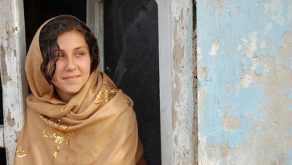 MINA WALKING might be one of the strongest feminine testimonies you’ve ever seen. Twelve-year-old Mina from Kabul has her hands full: keeping house and earning money for her father and grandfather. She has long since become accustomed to not expecting any praise for her sacrifice. She rarely finds time to play with friends. Things get even worse when it slowly dawns on her what kind of arrangements her father makes and where he has suddenly got money from… Director Yosef Baraki, living in Canada, was at the Schlingel Festival.
MINA WALKING might be one of the strongest feminine testimonies you’ve ever seen. Twelve-year-old Mina from Kabul has her hands full: keeping house and earning money for her father and grandfather. She has long since become accustomed to not expecting any praise for her sacrifice. She rarely finds time to play with friends. Things get even worse when it slowly dawns on her what kind of arrangements her father makes and where he has suddenly got money from… Director Yosef Baraki, living in Canada, was at the Schlingel Festival.
Yosef Baraki: After I finished school I had to decide whether I was going to work as an assistant, or doing what I wanted to do. I decided to make my first film instead. I went to Afghanistan, my home country. Having been disconnected from my country while living abroad, I tried to find a way back into the culture by observing and learning from people. The most accessible way to do that was through the street children. Because everyone in Afghanistan is so busy fulfilling their own needs, the only people I could speak to were the children on the street, trying to sell me things. They were always there on the street corner, selling their toys or whatever they could get. They have developed very good English by selling to foreigners. I started spending time with them, observing them.
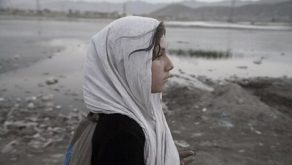 What did you see?
What did you see?
Baraki: I noticed there was a group of two boys in their twenties and two young girls, ten or eleven years old. One girl was making more money, she found ways to hustle, to be a better saleswoman. I started asking myself: what happens to her when she goes home at night? Does she have someone to take care of her? Does she have a house or is she homeless? Those questions were the perfect way to open up the culture to me. I wanted to tell a simple story about this girl, showing what would happen to her in seven days. I like films that observe simple proceedings instead of having a heavy plot structure.
Was it this one girl’s story?
Baraki: It was a combination of different elements, taken from different testimonies. I found out that street children often are orphaned or their parents are disabled, sometimes because of the war. In my story a girl on the lower end of the Afghan class system has to take care of a parent who is addicted to opium, which is unfortunately a common thing to happen. Mina impressed me by her desire to keep the family together. She does anything to outsell the boys on the street. She never had a childhood. It shows how this country is relying on its youth to guide it into the modern age, but the youth can’t move on, they’re stuck helping their parents who are ill-starred by the war.
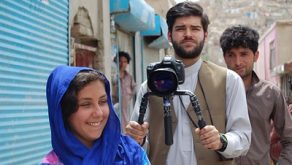 Is Mina’s assertiveness representative for young Afghani girls?
Is Mina’s assertiveness representative for young Afghani girls?
Baraki: Her character is a product of her environment. She spends all the time outside around older boys, which is very dangerous. Mina has to develop this attitude. Her aggression comes out of her survival instinct. If she had a middle class upbringing with a family, it wouldn’t be common for an Afghan girl to be this driven by aggression.
Is that why you casted Farzana Nawabi as Mina?
Baraki: I started the casting already before I arrived in Afghanistan. I spoke to 3 or 4 girls through Skype and immediately noticed they were very shy, looking to their parents and trying to be nice. I understood that was the way for an Afghan girl to behave. When Farzana came in, immediately something changed. She was like Mina: assertive, loud, talkative, making jokes. It was a joy to see her giving orders to everyone. I had only 19 days to shoot the film. If I casted someone with maybe a better look but a different attitude, I probably wouldn’t be able to bring out Mina’s character in 19 days. But Farzana stands very close to Mina. That was a key for me to complete the movie in such a short time. Moreover the background of Farzana’s parents, who are theatre actors, made our work easier, because in general it’s not common for an Afghan girl to act with a group of men in public.
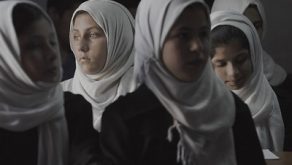 Can women in Afghanistan be so self-confident?
Can women in Afghanistan be so self-confident?
Baraki: They can. Nowadays women are encouraged to have a higher education and go to university. But even if Mina comes across as aggressive, she’s always obedient towards her father. She lowers her head, gives him the money she makes, prepares dinner and serves tea to his guests… Out on the streets there are no rules, anything goes. But at home a girl should respect her father. Even if Mina is like a parent to him and he depends on her in many ways.
I was intrigued by their relationship. Though you might blame him for the terrible things he does, at a certain moment he somehow pities his daughter.
Baraki: There is no reason to make him an evil villain. Selling Mina off is no easy decision for him. He’s worried about what will happen when she grows up. His friend might be capable of providing a future for Mina. Not a good future, but unfortunately sometimes the culture dictates such a process. Although nowadays only in extreme circumstances the age difference between married people is so big.
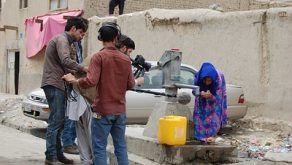 With the Afghan people not exactly living in luxury, I would expend to find a great solidarity among them. But on the streets there’s hardly any solidarity to find. It was all fighting and quarrelling.
With the Afghan people not exactly living in luxury, I would expend to find a great solidarity among them. But on the streets there’s hardly any solidarity to find. It was all fighting and quarrelling.
Baraki: Solidarity is hard to find when everybody is fighting for himself and his family to survive. During my days in Afghanistan, I witnessed an incredible solidarity and niceness in people. But on the street, among the less fortunate, life is different. Those people have been damaged for over 40 years and have nothing to rely on. Hopefully one day, if they can forget their most priority needs, you’ll be able to find solidarity in them too.
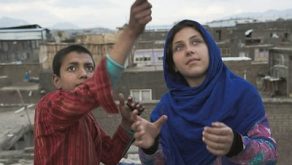 Is it a coincidence that the election day is the most sunny moment in the film? People seem happy, self-confident, and the sun shines brightly.
Is it a coincidence that the election day is the most sunny moment in the film? People seem happy, self-confident, and the sun shines brightly.
Baraki: The elections were going on by that time, and I really wanted to include them in the film. It’s a small scène because hope is still only a small possibility. These elections were the first democratic shift of power, now women had the right to vote. Perhaps, in dark times later, Mina can remember: there is hope that one day my voice will be heard.
In the ending scene, the balance between optimism and pessimism is very peculiar.
Baraki: It’s a cycle. When we first meet Mina on the street, she is told to take care of a little boy who is new. That’s a mirror shot to the ending, where Mina is surrounded by older women who are told to take care of her. It’s hard to imagine her future, but I hold on to the fact that she keeps her independence. Mina makes her own decision. Up until this point she was always living for her father and grandfather, but now she starts living for herself. I didn’t want to create a happy ending that was not representative for how people feel in Afghanistan today. It had to be one step in the right direction.
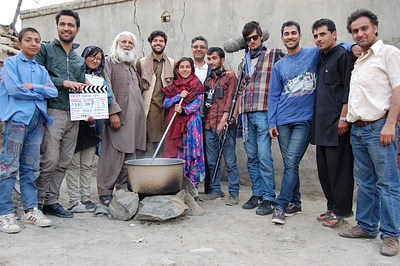
How was it for Farzana to make the film?
Baraki: She still tells me about the premiere in Berlin. That was her first time out of Afghanistan and it was such a beautiful experience. In the theatre everybody was clapping. It was overwhelming how people were showing her so much love, she’ll never forget that. When saying goodbye in the hotel in Berlin Farzana started crying. ‘Because I’ve never been treated so well in my life before,’ she said. For the Mumbai Film Festival at the end of October we’re hoping again to bring Farzana there.
Was the film shown in Afghanistan?
Baraki: It got a small release. The reaction was 60% positive, 40% not so positive. Afghanistan gets a lot of polished Bollywood cinema, so some people didn’t understand my style. They didn’t understand it was my conscious decision (and not for budgetary reasons) to make the film this way, and some might have wanted to keep this reality hidden.
How to imagine the city of Kabul?
Baraki: Kabul has a modern city centre. Every time Mina is on the street, I would say that is ‘downtown Kabul’. Mina lives in ‘Old Kabul’, among these mud-brick homes. Then off to the side, deeper into the valley, are the suburbs.
When filming on the streets, did reality sometimes interfere with your story?
Baraki: All the time, but that’s what I wanted. I invited reality. I didn’t have a script, but I had a treatment, an outline. Every day we drove to a location. I gave my actors a structure: this is the scene, this is where it should begin and end, but everything in between is up to us now. We improvised and then filmed. Thus a lot of reality oozed in. One scene we shot without sound, as they kept shooting rockets over our heads. I had to recreate the sound afterwards, it was totally wrecked. I wasn’t so cool about it then. “They’re shooting rockets! What should we do?” But the crew stayed calm: “Don’t worry, they do it all the time.”
And on a more simple, everyday life level?
Baraki: When filming the procession for grandfather’s funeral, we needed 5 or 6 men and a kart. We ran around Kabul, looking for an old man with a donkey, asking him to be in our film. We offered him money for two hours work, but when making a movie, two hours easily turns into eight. He was so nice, just being there quietly. All this we incorporated in the film. Most of what you see are just people on the street whom we asked to be in the film.
With the film traveling backwards and forwards from Canada to Poland, India, Egypt, Australia, Qatar, etc. will you ever have time to make a second movie?
Baraki: It seems like we’ll cover all the continents in one year’s time. For my next film, I would like to have a more detailed outline than I had now. Because I want to evolve as a director and try out different things, taking the style that I used for MINA and then improve it.
Gert Hermans
